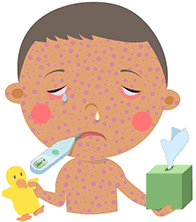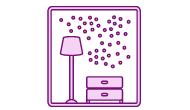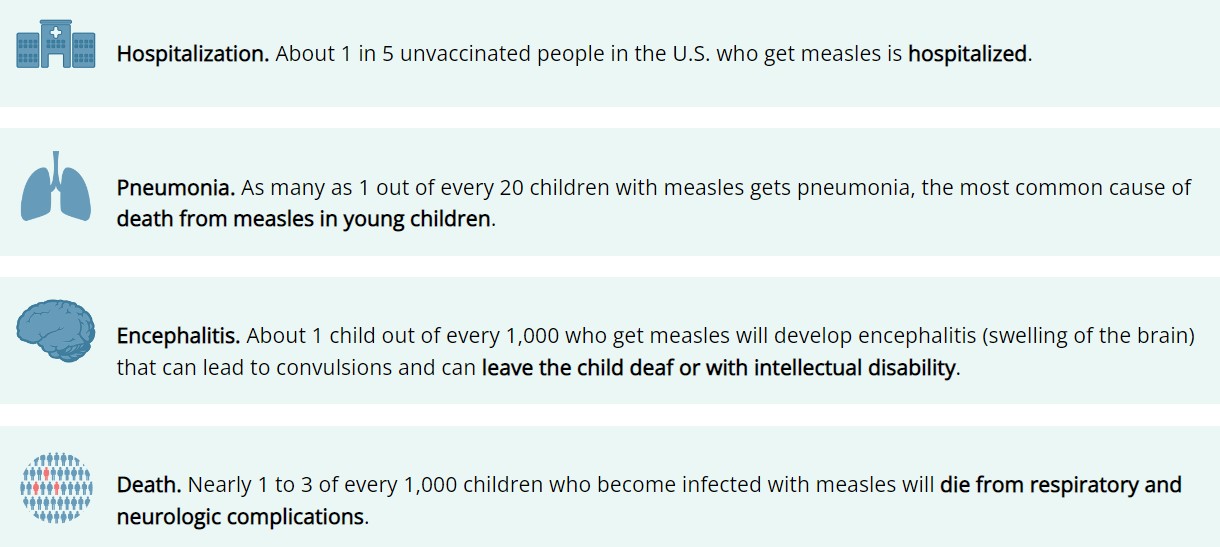Measles
Measles is very contagious and can cause serious illness. Measles is caused by a virus and spreads very easily when an infected person breathes, coughs or sneezes. Measles spreads so easily that anyone who is exposed and not immune (either by being immunized or having had measles in the past) will probably get it.

What are the symptoms of measles?
- Fever
- Runny nose
- Cough
- Red, watery eyes
- Rash that starts at the head and spreads to the rest of the body
People can spread measles before they show symptoms. Symptoms usually last 7-10 days.
Measles can be serious
 Measles is very contagious and can be serious. An unvaccinated child can get measles when traveling abroad or even in the U.S. Two doses of MMR vaccine provide the best protection against measles for your child.
Measles is very contagious and can be serious. An unvaccinated child can get measles when traveling abroad or even in the U.S. Two doses of MMR vaccine provide the best protection against measles for your child.
Some people think of measles as just a little rash and fever that clears up in a few days, but measles can cause serious health complications, especially in children younger than 5 years of age.
There is no way to tell in advance the severity of the symptoms your child will experience, but here are some facts:
- About 1 in 5 people in the U.S. who get measles will be hospitalized
- 1 out of every 1,000 people with measles will develop brain swelling, which could lead to brain damage
- 1 to 3 out of 1,000 people with measles will die, even with the best care
Some of the more common measles symptoms include:
- high fever (may spike to more than 104° F)
- cough
- runny nose
- red, watery eyes
- rash (3-5 days after symptoms begin)
Measles is very contagious
 Measles spreads through the air when an infected person coughs or sneezes. It is so contagious that if one person has it, up to 9 out of 10 people around him or her will also become infected if they are not protected. Your child can get measles just by being in a room where a person with measles has been, even up to two hours after that person has left. An infected person can spread measles to others even before knowing he/she has the disease—from four days before developing the measles rash through four days afterward.
Measles spreads through the air when an infected person coughs or sneezes. It is so contagious that if one person has it, up to 9 out of 10 people around him or her will also become infected if they are not protected. Your child can get measles just by being in a room where a person with measles has been, even up to two hours after that person has left. An infected person can spread measles to others even before knowing he/she has the disease—from four days before developing the measles rash through four days afterward.
Your child can still get measles in the United States
 Measles was declared eliminated from the U.S. in 2000 thanks to a highly effective vaccination program. Eliminated means that the disease is no longer constantly present in this country. However, measles is still common in many parts of the world.
Measles was declared eliminated from the U.S. in 2000 thanks to a highly effective vaccination program. Eliminated means that the disease is no longer constantly present in this country. However, measles is still common in many parts of the world.
Even if your family does not travel internationally, you could come into contact with measles anywhere in your community. Every year, measles is brought into the United States by unvaccinated travelers (mostly Americans and sometimes foreign visitors) who get measles while they are in other countries. Anyone who is not protected against measles is at risk.
You have the power to protect your child against measles with a safe and effective vaccine
 The best protection against measles is measles-mumps-rubella (MMR) vaccine. MMR vaccine provides long-lasting protection against all strains of measles.
The best protection against measles is measles-mumps-rubella (MMR) vaccine. MMR vaccine provides long-lasting protection against all strains of measles.
Your child needs two doses of MMR vaccine for best protection:
- The first dose at 12 through 15 months of age
- The second dose at 4 through 6 years of age
If your family is traveling overseas, the vaccine recommendations are a little different:
- If your baby is 6 through 11 months old, he or she should receive 1 dose of MMR vaccine before leaving.
- If your child is 12 months of age or older, he or she will need 2 doses of MMR vaccine (separated by at least 28 days) before departure.
Another vaccine, the measles-mumps-rubella-varicella (MMRV) vaccine, which protects against 4 diseases, is also available to children 12 months through 12 years of age.

Measles is a highly contagious virus that lives in the nose and throat mucus of an infected person. It can spread to others through coughing and sneezing.
If other people breathe the contaminated air or touch the infected surface, then touch their eyes, noses, or mouths, they can become infected.
Animals do not get or spread measles.
Measles is one of the most contagious diseases. Call your healthcare provider immediately if you think you or your child have been exposed.
 Measles is so contagious that if one person has it, up to 90% of the people close to that person who are not immune will also become infected.
Measles is so contagious that if one person has it, up to 90% of the people close to that person who are not immune will also become infected.
Infected people can spread measles to others from four days before through four days after the rash appears.
Measles virus can live for up to two hours in an airspace after an infected person leaves an area.
A total of 118 cases of measles were reported nationwide in 2022, according to the CDC. It is the highest number of measles cases reported in the U.S. since 2019 — in 2020 and 2021 combined, there were a total of 52 measles cases reported in the U.S.
In a given year, more measles cases can occur for any of the following reasons:
- an increase in the number of travelers who get measles abroad and bring it into the U.S., and/or
- further spread of measles in U.S. communities with pockets of unvaccinated people.
Measles can be serious. Children younger than 5 years of age and adults older than 20 years of age are more likely to suffer from complications. Common complications are ear infections and diarrhea. Serious complications include pneumonia and encephalitis.
Measles can be serious in all age groups. However, there are several groups that are more likely to suffer from measles complications:
- Children younger than 5 years of age
- Adults older than 20 years of age
- Pregnant women
- People with compromised immune systems, such as from leukemia or HIV infection
Common complications include:
- Ear infections occur in about one out of every 10 children with measles.
- Diarrhea is reported in less than one out of 10 people with measles.
Severe complications in children and adults include:
Some people may suffer from severe complications, such as pneumonia (infection of the lungs) and encephalitis (swelling of the brain). They may need to be hospitalized and could die.
Long-term complications include:
Subacute sclerosing panencephalitis (SSPE) is a very rare, but fatal disease of the central nervous system that results from a measles virus infection acquired earlier in life.
- SSPE generally develops 7 to 10 years after a person has measles, even though the person seems to have fully recovered from the illness.
- Since measles was eliminated in 2000, SSPE is rarely reported in the United States.
- Among people who contracted measles during the resurgence in the United States in 1989 to 1991, 7 to 11 out of every 100,000 were estimated to be at risk for developing SSPE.
- The risk of developing SSPE may be higher for a person who gets measles before they are 2 years of age.


